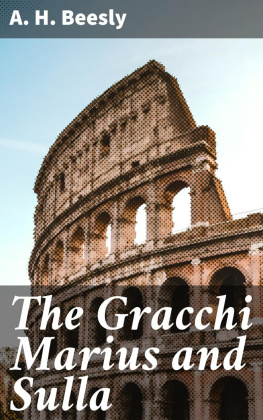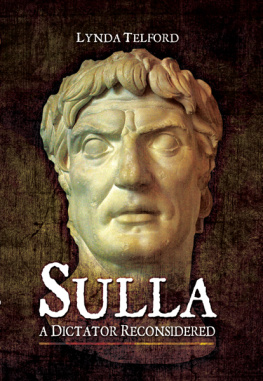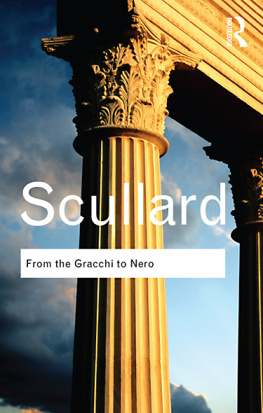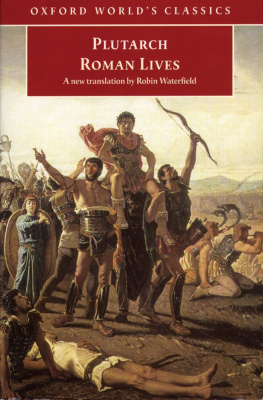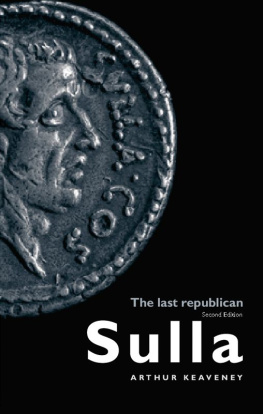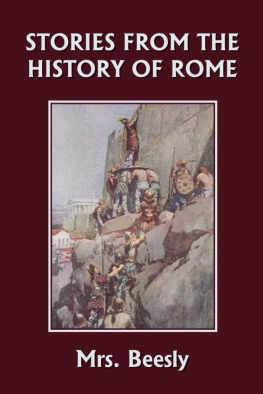PREFACE
Table of Contents
It would be scarcely possible for anyone writing on the periodembraced in this volume, to perform his task adequately without makinghimself familiar with Mr. Long's 'History of the Decline of the RomanRepublic' and Mommsen's 'History of Rome.' To do over again (as thoughthe work had never been attempted) what has been done once for allaccurately and well, would be mere prudery of punctiliousness. Butwhile I acknowledge my debt of gratitude to both these eminenthistorians, I must add that for the whole period I have carefullyexamined the original authorities, often coming to conclusions widelydiffering from those of Mr. Long. And I venture to hope that fromthe advantage I have had in being able to compare the works of twowriters, one of whom has well-nigh exhausted the theories as theother has the facts of the subject, I have succeeded in giving a moreconsistent and faithful account of the leaders and legislation of therevolutionary era than has hitherto been written. Certainly therecould be no more instructive commentary on either history than thestudy of the other, for each supplements the other and emphasizesits defects. If Mommsen at times pushes conjecture to the verge ofinvention, as in his account of the junction of the Helvetii andCimbri, Mr. Long, in his dogged determination never to swerve fromfacts to inference, falls into the opposite extreme, resorting tosomewhat Cyclopean architecture in his detestation of stucco. Butmy admiration for his history is but slightly qualified by suchconsiderations, and to any student who may be stimulated by thevolumes of this series to acquire what would virtually amount to anacquaintance first-hand with the narratives of ancient writers, Iwould say 'Read Mr. Long's history.' To do so is to learn not onlyknowledge but a lesson in historical study generally. For the writingsof a man with whom style is not the first object are as refreshing ashis scorn for romancing history is wholesome, and the grave irony withwhich he records its slips amusing.
A.H.B.
CHAPTER I.
ANTECEDENTS OF THE REVOLUTION.
Previous history of the Roman ordersThe Ager PublicusPreviousattempts at agrarian legislationRoman slaveryThe first SlaveWarThe Nobiles, Optimates, Populares, EquitesClassification of thecomponent parts of the Roman StateState of the transmarine provinces
CHAPTER II.
TIBERIUS GRACCHUS.
Scipio AemilianusTribunate of Tiberius GracchusHis agrarianproposalsWisdom of themGrievances of the possessorsOctaviusthwarts GracchusConduct of Gracchus defendedHis other intendedreformsHe stands again for the tribunateHis motivesHis murder
CHAPTER III.
CAIUS GRACCHUS.
Blossius sparedThe law of T. Gracchus carried outExplanationof Italian opposition to itAttitude of Scipio AemilianusHismurderQuaestorship of Caius GracchusThe Alien Act ofPennusFlaccus proposes to give the Socii the franchiseRevolt andextirpation of FregellaeTribunate of Caius GracchusCompared toTiberiusHis aimsHis Corn Law defendedHis Lex JudiciariaHis lawconcerning the taxation of AsiaHis conciliation of the equitesHiscoloniesHe proposes to give the franchise to the ItaliansOtherprojectsMachinations of the nobles against himM. Livius Drususoutbids himStands again for the tribunate, but is rejectedHismurderSome of his laws remain in forceThe Maria LexReactionarylegislation of the SenateThe Lex ThoriaAll offices confined to aclose circle
CHAPTER IV.
THE JUGURTHINE WAR.
Legacy of AttalusAristonicus usurps his kingdomSettlement ofAsiaJugurtha murders Hiempsal and attacks AdherbalHis intriguesat Rome and the infamy of M. Aemilius Scaurus and the other RomannoblesThree commissions bribed by JugurthaAdherbal murderedRomedeclares war and Jugurtha bribes the Roman generals, Bestia andScaurusMemmius denounces them at RomeJugurtha summoned to Rome,where he murders MassivaHe defeats Aulus AlbinosMetellus sentagainst him Jugurtha defeated on the MuthulKeeps up a guerillawarfareMarius stands for the consulship, and succeedsMetellusBocchus betrays Jugurtha to SullaSettlement of Numidia
CHAPTER V.
THE CIMBRI AND TEUTONES.
Recommencement of the Social struggle at RomeMarius the popular
heroIncessant frontier-warfare of the RomansThe Cimbri defeat
Carbo and SilanusCaepio and 'The Gold of Tolosa'The Cimbri defeat
Scaurus and CaepioMarius elected consulThe Cimbri march towards
SpainTheir nationalityTheir plan of operationsPlan of
MariusBattle of Aquae SextiaeBattle of Vercellae
CHAPTER VI.
THE ROMAN ARMY.
Second Slave WarAquillius ends itChanges in the RomanarmyUniform equipment of the legionaryMariani muliThe cohortthe tactical unitThe officersNumbers of the legionThe payThepraetorian cohortDislike to serviceThe army becomes professional
CHAPTER VII.
SATURNINUS AND DRUSUS.
Saturninus takes up the Gracchan policy, in league with Glaucia andMariusThe Lex Servilia meant to relieve the provincials, conciliatethe equites, and throw open the judicia to all citizensAgrarian lawof SaturninusHis laws about grain and treasonMurder of Memmius,Glaucia's rivalSaturninus is attacked and deserted by MariusTheLex Licinia Minucia heralds the Social WarDrusus attemptsreformObliged to tread in the steps of the GracchiHis proposalswith regard to the Italians, the coinage, corn, colonies and theequitesOpposed by Philippus and murdered
CHAPTER VIII.
THE SOCIAL WAR.
Interests of Italian capitalists and small farmers opposedThe SocialWar breaks out at AsculumThe insurgents choose Corfinium as theircapitalIn the first year they gain everywhereThen the Lex Julia ispassed and in the second year they lose everywhereThe star of Sullarises, that of Marius declinesThe Lex Plautia PapiriaFirst yearof the warThe confederates defeat Perperna, Crassus, Caesar,Lupus, Caepio, and take town after townThe Umbrians and EtruscansRevoltSecond yearPompeius triumphs in the north, Cosconius inthe south-east, Sulla in the south-westRevolution at RomeTheconfederates courted by both partiesThe rebellion smoulders on tillfinally quenched by Sulla after the Mithridatic War
CHAPTER IX.
SULPICIUS.
Financial crisis at RomeSulpicius Rufus attempts to reform thegovernment, and complete the enfranchisement of the ItaliansHis lawsforcibly carried by the aid of MariusSulla driven from Rome flies tothe army at Nola, and marches at their head against MariusSulpiciusslainMarius outlawedSulla leaves Italy after reorganizing theSenate and the comitia
CHAPTER X.
MARIUS AND CINNA.
Flight of MariusHis romantic adventures at Circeii, Minturnae,CarthageCinna takes up the Italian causeDriven from Rome byOctavius, he flies to the army in Campania and marches on RomeMariuslands in EtruriaOctavius summons Pompeius from Etruria andtheir armies surround the cityMarius and Cinna enter RomeTheproscriptionsSeventh consulship and death of MariusCinna supreme
CHAPTER XI.
THE FIRST MITHRIDATIC WAR.
Sertorius in SpainCyrene bequeathed to RomePrevious history of
MithridatesHis submission to AquilliusAquillius forces on a


